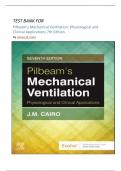Exam (elaborations)
TEST BANK FOR Pilbeam's Mechanical Ventilation: Physiological and Clinical Applications 7th Edition by JamesST E M. Cairo ||NEWEDITION(2024)
Table of Contents Chapter 1; Basic Terms and Concepts of Mechanical Ventilation Test Bank 3 Chapter 2; How Ventilators Work Test Bank 25 Chapter 3; How a Breath Is Delivered Test Bank 34 Chapter 4; Establishing the Need for Mechanical Ventilation Test Bank 50 Chapter 5; Selecting the Ventilato...
[Show more]



